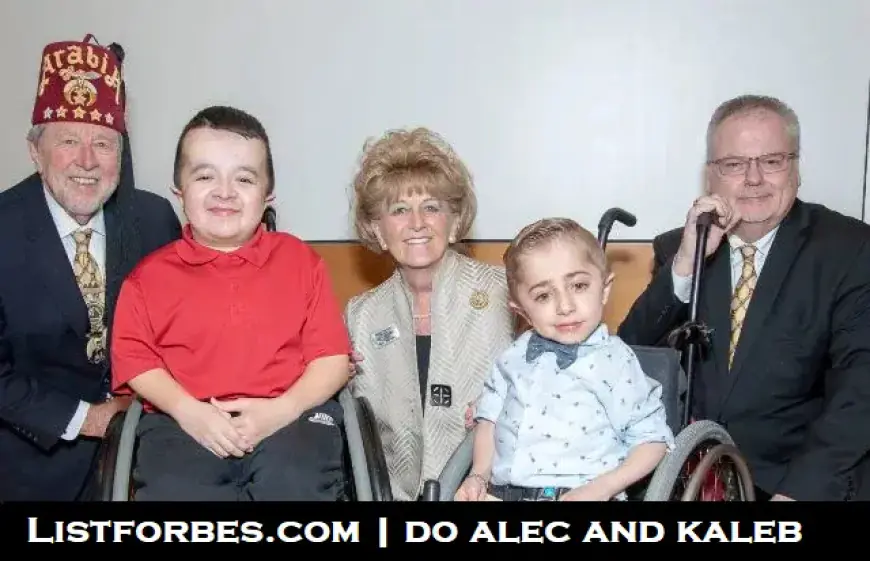Do Alec and Kaleb Get Paid for Their Commercials? The Facts Revealed
In this comprehensive composition, we will delve into the details, looking at the backgrounds of these young stars, the nature of their work, and the data underlying their compensation.

In the world of TV and online advertising, commercials featuring endearing personalities frequently capture followers' attention and leave lasting prints. Alec Cabacungan and Kaleb Wolf De Melo Torres are two similar individuals who have become familiar faces, particularly through their appearances in commercials for Shriners Hospitals for Children. Their charm, adaptability, and inspiring stories have made them cherished numbers, but a common question arises: do Alec and Kaleb get paid for their commercials?. List Forbes
preface
Who are Alec and Kaleb?
Alec Cabacungan and Kaleb Wolf De Melo Torres are two youthful spokespeople for Shriners Hospitals for Children, a network of 22 non-profit medical installations across North America. These hospitals provide technical care for pediatric orthopedics, spinal cord injuries, becks, and other medical conditions. Alec and Kaleb have become the faces of Shriners' fundraising and mindfulness juggernauts, participating in their particular peregrinations and the impact Shriners have had on their lives.
The Purpose of This Composition
The purpose of this composition is to provide a detailed description of Alec and Kaleb's involvement with Shriners Hospitals for Children, the nature of their participation in commercials, and the compensation they accept. We'll examine the ethical considerations, the structure of non-profit associations like Shriners, and the broader environment of children appearing in advertising.
Background: Alec Cabacungan and Kaleb Wolf De Melo Torres
Alec Cabacungan
Alec Cabacungan was born with osteogenesis imperfecta, also known as brittle bone complaint, a condition that makes bones fragile and prone to fractures. Despite his medical challenges, Alec's positive attitude and determination have made him a source of alleviation for numerous.
Trip with Shriners
Alec has been receiving treatment at Shriners Hospitals for Children since he was a young child. His involvement with Shriners' commercials began as a way to partake in his story and raise awareness about the sanitarium's charge. Over the years, Alec has become a well-known figure, sharing in multitudinous commercials and public appearances.
Kaleb Wolf de Melo Torres
Kaleb Wolf de Melo Torres was also born with osteogenesis imperfecta. Like Alec, Kaleb has faced significant medical challenges but has approached them with adaptability and courage.
Trip with Shriners
Kaleb's relationship with Shriners Hospitals for Children started when he was veritably youthful. Colorful commercials and promotional accouterments for the sanitarium have featured his story, just like Alec's. Kaleb's cheerful address and contagious smile have made him a favorite among observers.

Understanding Shriner Hospitals for Children
Missions and Services
Shriners Hospitals for Children is devoted to furnishing technical pediatric care, conducting innovative exploration, and offering educational openings for medical professionals. Their charge is to improve children's lives regardless of their families' financial capability, ensuring that all children receive the care they need.
Backing and Fundraising
Shriners, as a non-profit association, relies heavily on donations and fundraising sweats to support their operations. The commercials featuring Alec and Kaleb play a pivotal role in these sweats, helping to raise mindfulness and finances to continue providing high-quality care to children.
The part of Alec and Kaleb in Shriners' Commercials
Purpose of the Commercials
-
The commercials featuring Alec and Kaleb aim toRaise mindfulness Educate the public about the services offered by Shriners Hospitals for Children.
-
Fundraising Encourage donations to support the sanitarium's charge.
-
Inspire Share uplifting stories of adaptability and stopgap, demonstrating the positive impact of Shriners on children's lives.
product and participation
The product of these commercials involves several ways
-
Scriptwriting and planning Creating a compelling narrative that highlights the sanitarium's work and the children's stories.
-
Filming Alec and Kaleb attend rephotographing sessions, participate in their gestations, and interact with sanitarium staff.
-
Post-Production Editing the footage to produce a polished final product that resonates with observers.
Frequence and Reach
These commercials are vented regularly on colorful TV networks and participated extensively online. Their reach is extensive, making Alec and Kaleb recognizable figures throughout North America.
Do Alec and Kaleb get paid?
Ethical Considerations
-
The question of whether Alec and Kaleb get paid for their commercials involves several ethical considerations.
-
Compensation for time and effort Admitting the time and trouble they invest in sharing in these commercials.
-
Fair treatment means that Alec and Kaleb are treated fairly and hypocritically, given their medical conditions and youthful age.
-
translucency Maintaining transparency about their involvement and any compensation they admit.
Non-Profit Organization Programs
Shriners Hospitals for Children, like numerous non-profits, has specific programs regarding compensation for individualities featured in their promotional accouterments. These programs are designed to ensure that finances are used primarily to support the sanitarium's charges and services.
Sanctioned statements and reports
As of now, there have been no sanctioned public statements from Shriners Hospitals for Children explicitly detailing whether Alec and Kaleb admit financial compensation for their appearances in commercials. Still, it's important to note that these children and their families may accept support in other forms, such as medical care, trip charges, and other necessities related to their participation.
Assiduity norms
In the broader environment of advertising, it's common for actors, including children, to admit compensation for their time and trouble. This compensation can take many forms, including financial payment, literacy, or other benefits.
The impact of Alec and Kaleb's commercials
Raising mindfulness and finances
The commercials featuring Alec and Kaleb have been largely effective in raising awareness about Shriners Hospitals for Children. Their stories reverberate with observers, inspiring numerous to contribute and support the sanitarium's charge. Their narratives' emotional appeal helps to communicate the significance of the sanitarium's work in a compelling way.
Inspiring Others
Beyond fundraising, Alec and Kaleb serve as role models for other children facing analogous challenges. Their courage, positivity, and determination offer a stopgap and alleviation to families dealing with pediatric medical conditions.
Particular growth and development
Participating in these commercials has probably had a positive impact on Alec and Kaleb's particular growth and development. The experience provides them with public speaking openings, media exposure, and a platform to partake in their stories, all of which can contribute to their confidence and communication chops.
Broader Context Children in Advertising
The legal and regulatory framework
The involvement of children in advertising is governed by colorful legal and non-supervisory fabrics designed to cover their rights and well-being. These regulations ensure that children aren't exploited and that their participation is in their best interests.
Crucial Regulations
Work Hours and Conditions Limits on the number of hours children can work and provides safe working conditions.
-
Compensation is fair compensation for their time and trouble.
-
For their participation, maternal or guardian consent is required.
Ethical advertising practices
Ethical advertising practices emphasize the need to
-
Respect children's rights. Prioritize the welfare and rights of child actors.
-
translucency Maintain transparency with the cult about the nature of the announcements and children's involvement.
-
Responsible messaging ensures that the content is applicable and regardable.
The Public's Perspective
Bystander responses
The public has generally responded appreciatively to the commercials featuring Alec and Kaleb. Observers appreciate the authenticity and emotional depth of their stories, which help to humanize the sanitarium's charge and work.
Media Coverage
The media content of Alec and Kaleb's commercials has also been favorable, highlighting their inspirational peregrinations and the impact of Shriners Hospitals for Children. News outlets frequently feature stories about their genders, further amplifying their reach and influence.
Conclusion
The commercials featuring Alec Cabacungan and Kaleb Wolf De Melo Torres have become iconic in the realm of non-profit advertising, effectively raising awareness and finances for Shriners Hospitals for Children. While the specific details of their compensation remain private, it's clear that their participation is driven by a commitment to supporting the sanitarium's charge and inspiring others.
Their stories serve as important memorials to the adaptability of the mortal spirit and the positive impact that associations like Shriners can have on children's lives. As the public continues to support and engage with these commercials, Alec and Kaleb will really remain cherished numbers, representing stopgap and determination in the face of adversity.
Also Read This Article : The Ultimate Showdown: Ngannou vs Fury – What to Expect
What's Your Reaction?
















































